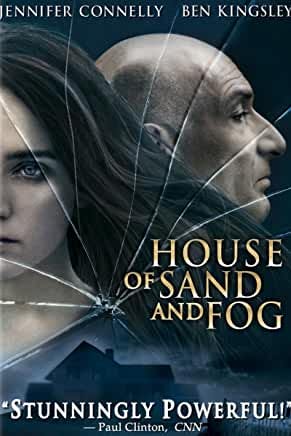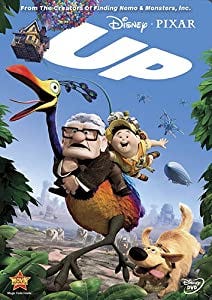When A House Is A Tragic Character
A Tale Of Two Movies: "House of Sand and Fog" (2003) and "Up" (2009)
Image by L.E. Wilson from RedBubble based on work by Oscar on Pixabay
It began with a newspaper article of a woman who was evicted from her house for failure to pay back taxes she said she didn't owe. The house was repossessed. They evicted her, sold it off and then discovered they had the wrong house. This happens a lot.
— Andre Dubus III, Author of the novel, House of Sand and Fog
Movies can be invaluable wellsprings of knowledge, and none more so as when they put to screen stories based on real life events. Many of these are tragedies, and thus can serve as cautionary examples offering to illustrate the dangers that may befall us so that we can take heed and try, as best we can, to avoid being another nameless victim. Of the many horrors and injustices that we may be unlucky enough to encounter are those involving abuse of government power. From repressive regimes that restrict human rights and trample on human dignity to manifest incompetence that likewise results in tremendous and avoidable human suffering, the potential of government to cause catastrophic problems is significant.
House of Sand and Fog (2003) is a drama co-written and directed by Vadim Perelman, based on the book by Andre Dubus III, about Kathy Nicolo (Jennifer Connelly), a California woman who loses her house because of a mistake by the local government office, and then fights to get it back from the Iranian immigrant family that bought it from the county.
Life Lesson: "Every thing you love is very likely to be lost, but in the end, love will return in a different way." — Franz Kafka
🍿Movie Scene Link (movie quote)
The movie House of Sand and Fog (2003) tells such a tale. It intertwines two stories of government abuse. One that caused a family to flee the violent upheavals and restructuring of society caused by the authoritarian government of Iran, and another that has caused many across “the land of the free,” the United States, to likewise become homeless refugees in their own land. Because this is such a shock, because it is so unbelievable, we have to start with the true, verifiable stories first.
The country of Iran at one point had a democratically elected government, but through a series of tragic events including a coup and a violent revolution, it is as of this writing, a country where human rights are severely limited and general daily life brutally constrained entirely as a result of government laws and regulations. It’s a country with a government so inhumane that a woman, Mahsa Amini, was beaten to death by the morality police for not wearing the appropriate dress, the mandatory hijab, that covers the head, neck, arms and legs, and where pet owners are arrested for walking their dogs in parks, which is not allowed to “protect the safety of the public.” Iran uses executions and lengthy prison sentences to punish nonviolent crimes and minor offenses while also encouraging open discrimination against whole groups of people, including all women.
The Unites States, meanwhile, has a constitution that delineates a number of inalienable rights, yet, many of these rights, e.g. the right to act in self-defense, the right to own private property, the right to free speech etc. are constantly being attacked and threatened, and some of the main culprits responsible for this decimation of rights are the local governments. Specifically, the regulations and taxes imposed by local governments have led many American citizens to unjustly lose their family homes, in their entirety, without redress, without compensation, without humanity. Property taxes, which amount to paying a sales tax to the government in perpetuity, is unlike any other tax levied on people, and the result is that we don’t actually own our homes in the United States, we’re just paying rent to the local lords and are at their mercy like feudal peasants from the Middle Ages.
House of Sand and Fog brings these two stories to a head. An immigrant Iranian family trying to rebuild their lives lost due to the terrible oppression of the government, is pitted against a California woman whose life is similarly uprooted by an uncaring and inhumane local government that mistakenly charged her for taxes she did not owe then auctioned off her house, which the Iranian family bought, before she could get help. Lest you think the local American government unjustly and unfairly taking away your house is the fictional part—it’s not—and it happens all the time in the USA:
Left With Nothing (The Washington Post, September 8, 2013)
How The Elderly Lose Their Rights (The New Yorker, October 2, 2017)
A Property Tax Money Machine Crushes Families (Bloomberg, December 20, 2021)
People in the USA have lost their homes for failing to pay $136, $44.79, even just $6.30 in property taxes. A 90-year-old woman almost lost her house for failing to pay $0.06, six cents, in property taxes, thus making a slogan of the Libertarian Party empirically true, “taxation is theft.” If one day something like this can just happen to you, everything you’ve built taken from you, leaving you homeless, how is this materially different than living in a country like Iran? It’s enough to leave you thinking that if it weren’t for government interference, people could have beautiful lives. And it makes the words of Republican President Ronald Reagan, spoken in his inaugural address, ring ever more true in our ears:
In this present crisis, government is not the solution to our problem; government is the problem. From time to time we've been tempted to believe that society has become too complex to be managed by self-rule, that government by an elite group is superior to government for, by, and of the people. Well, if no one among us is capable of governing himself, then who among us has the capacity to govern someone else? All of us together, in and out of government, must bear the burden. The solutions we seek must be equitable, with no one group singled out to pay a higher price.
Up (2009) is an animated fantasy co-written and co-directed by Pete Docter and Bob Peterson about an elderly widower, Carl Fredricksen (Ed Asner), who moves his house with the help of a young boy, Russell (Jordan Nagai), to South America, in order to fulfill a lifelong wish he shared with his wife Ellie.
Life Lesson: Caring for living beings is more meaningful than caring for material possessions.
🍿Movie Scene Link (movie quote)
But there is something more than tragedy in this story. The movie reveals an ultimate truth that makes House of Sand and Fog worth watching, and amazingly it’s something that it shares with another incredible movie, Pixar’s Up (2009), which is a story about a man who is forced to leave his home by a court order and decides to fly his house, via balloon, to another country instead. In both of these movies houses are characters, important beings that induce action, purpose, and give meaning to the protagonists. And we embrace that, we believe that, because it’s probably an innate territorial urge we have to claim a little plot of earth as our own. We all want, and need, a home. We want our treasured possessions to be protected, and most of us will fight to defend them from theft.
And yet, in the midst of this battle of who is the rightful owner of the house of sand and fog—the woman who is a victim of an incompetent government that took her house unfairly, or the family who is a victim of a cruel government that forced them to leave the lives they had—something happens that clarifies everything. Like in the movie Up, we come to understand, deeply, and thoroughly that of the things we value, the material possessions, our pride, appearances, reputation—none of it really matters in the face of death. It is as Steve Jobs said:
Remembering that I'll be dead soon is the most important tool I've ever encountered to help me make the big choices in life. Because almost everything — all external expectations, all pride, all fear of embarrassment or failure — these things just fall away in the face of death, leaving only what is truly important. Remembering that you are going to die is the best way I know to avoid the trap of thinking you have something to lose. You are already naked. There is no reason not to follow your heart.
The movie House of Sand and Fog is not for those who are inclined to ask, “where is the justice?” They will be disappointed because in this life perhaps the truth is that we can only hope that the injustices we face aren’t fatal, that we can accept our loses, and that we can rebuild somehow, because no one ever said that life was fair. And it isn’t. But one thing is clear: only our loved ones matter, and nothing, not even a house with an infinite view of the sea, can ever come close to being as important.
So please don’t take love for granted, but do find out what your government is up to and see what you can do to limit its power—for all of our sakes.
Visit the moviewise catalogue—a searchable database of one sentence movie summaries, movie quotes, and movie wisdom—for movie recommendations.
Also visit the moviewise store. Get a t-shirt, bag, or pillow with your favorite #LifeLesson from a movie. Reply to this or leave a comment below to make a request.











I work for local government and I am getting ready to retire. While in principle I agree with the author one should be reminded that Police and Fire protection, schools, road maintenance and repair and other supportive activities to our lives are paid for by property taxes.
Is there abuse by local governments and local officials, usually elected? There is, often masked by local laws and privileges' and just as often unknown to the population at large (Example: when a local official arranges for the government to buy property from the officials friend who in turn will contribute to the reelection of the official. Just as horrific is that many of these "abuses" are legal under local law.
The reality , stark as far as we know, is that life is a very short explosion of energy ...... a consciousness we believe and then it all ends. We have no idea of why or how or wait awaits us ... if anything. But we do know we can take nothing with us. We can leave, however, loving memories among those we loved. True, in the short run they may more appreciate the mutual funds or real estate we leave when we die but eventually they will understand the real values they inherited if we shared them during our brief interlude of existence.
A profound film indeed.
I haven’t seen either of these, but I’m adding them to my list now!